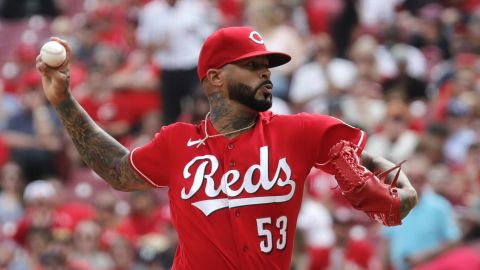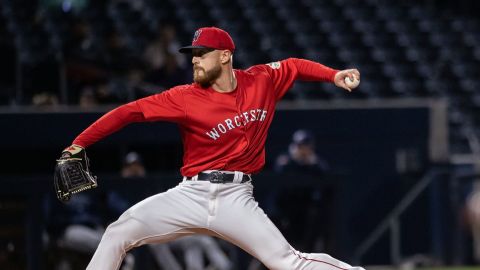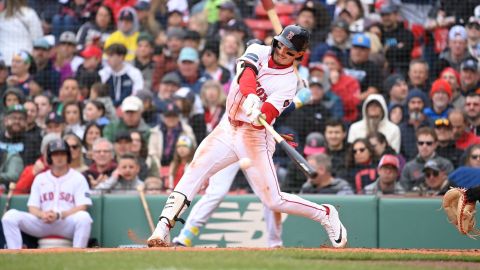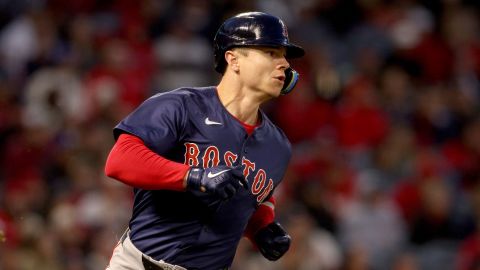Editor’s Note: NESN.com Red Sox reporter Tony Lee will focus on a different aspect of Adrian Gonzalez’s life every day this week. On Monday, Lee took a look at Gonzalez’s upbringing and baseball roots.
Adrian Gonzalez and his baseball exploits had straddled the border between Southern California and Tijuana, Mexico, for the first 18 years of his life. Just weeks after that birthday, he was taking his show to the Sunshine State.
Gonzalez had been drafted first overall by the Florida Marlins and was assigned to the club’s rookie-level team in Melbourne, Fla., to begin his professional career, the culmination of a meteoric rise to the top of the high school baseball landscape while at Eastlake High in Chula Vista, Calif., just outside of San Diego.
One would think that the Marlins, who were in full-fledged rebuilding mode just three years after winning the 1997 World Series, would covet a sweet-swinging, smooth-fielding first baseman such as Gonzalez, especially after he hit .297 in that first short season and took the Single-A Midwest League by storm in his second year in 2001. But there was another such player a few years ahead of him in the organization, and the presence of a young and blossoming Derrek Lee, who, coincidentally, had been taken by the San Diego Padres in the first round seven years earlier, made Gonzalez expendable.
So, too, did a lingering wrist problem that presented Gonzalez, who was coming off back-to-back impressive campaigns that saw him drive in a combined 199 runs between Single-A Kane County and Double-A Portland, with his first major obstacle.
The ailment required offseason surgery, and Gonzalez began the 2003 season in rehab before getting his first taste of Triple-A pitching. It was a stiff test for a 21-year-old coming off an injury, and he largely failed. After an unimpressive 39 games at Albuquerque, he was demoted back to Double-A, where he hit .307 but struggled to showcase any power. And when the Marlins needed some help for the bullpen to complete its rise back to the top of the baseball world in 2003, they shipped Gonzalez as part of a package to Texas in exchange for one-time Red Sox reliever Ugueth Urbina, who saved six games down the stretch and then four more in the postseason as the Josh Beckett-led club won its second title in seven seasons.
That 2003 season, which included one surgery, two organizations and three teams in three states, comprised what Gonzalez called a “roller coaster.” He and his wife, Betsy, moved a total of eight times in the course of the year. Throughout the process, the can’t-miss kid was called into question for the first time, some wondering if his “soft” body would ever take the rigors of a 162-game slate, and if he had the work ethic to prepare.
These criticisms began a somewhat odd journey that would see one of the best hitters in the minors, and eventually the majors, get traded three times in a seven-year span.
That first deal to the Rangers gave Gonzalez a fresh start, and he ran with it. He hit .304 with 12 homers and 88 RBIs in 123 games for Triple-A Oklahoma in 2004. He then finally put it all together the following season. In just 84 games with the RedHawks, Gonzalez, 23 and filled out at this point, batted .338 with 18 home runs, posting a .960 OPS in the process. He played 43 games down the stretch for Texas that year, most of them as the team’s designated hitter due to the presence of another stud first baseman who would make Gonzalez an afterthought once again.
Mark Teixeira, now the man that many will compare to Gonzalez in the midst of the game’s biggest rivalry, hit 44 homers and drove in 144 runs for Texas that same season that Gonzalez broke out at the minor league level. Once again, there was a roadblock at the position, and once again, Gonzalez’s organization saw a chance to get something for all that talent, shipping the budding slugger to San Diego in what would become a somewhat regrettable move for Texas.
As for Gonzalez, would he have to prove himself again, even in his hometown? Would he need to put up big numbers? Would he have to shed the stigma of being soft and a poor worker, regardless of how unfounded such criticisms might’ve been? Facing such obstacles, but knowing he was presented with a chance to move forward, Gonzalez knew it was time to recommit.
“There was a day, just one day, where I just didn’t want to do what I was going through anymore,” he said of bouncing around and waiting for the opportunity. “That was my mind-set. No more up-and-down, back-and-forth. I wasn’t ready to give up the game. I just wanted to play in a place where I knew I was going to have an opportunity.”
That’s what San Diego provided. Opportunity had knocked. Soon, Gonzalez would open the door and embrace the chance he had been given.
Check out Wednesday’s story on Gonzalez’s time in San Diego, where he went from a guy just looking for a home to a superstar in his hometown.



